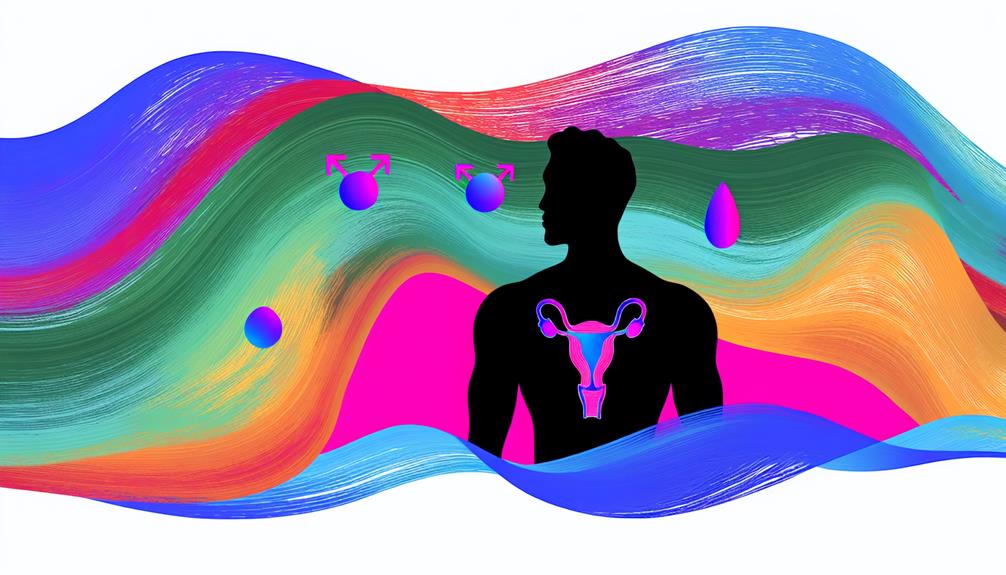Hormonal fluctuations considerably impact men's health, affecting mood, energy levels, and physical performance. I've noticed that testosterone plays an essential role in regulating mood and libido, with levels peaking in summer and declining in winter. Elevated cortisol from stress disrupts hormonal balance and can lead to fatigue and emotional instability. These shifts can impair workout effectiveness and sexual function. To maintain balance, I recommend focusing on a diet rich in whole foods, regular exercise, and effective stress management. Understanding these dynamics can help you navigate the complexities of hormonal health and its implications for well-being.
Overview of Hormonal Fluctuations

How do hormonal fluctuations impact men's health? In examining this question, I've come to appreciate that hormonal levels in men aren't static; they fluctuate due to various factors, including seasonal variations and dietary influences. For instance, testosterone levels can exhibit significant seasonal patterns, typically peaking in late summer and declining in winter. This seasonal variation can affect mood, energy levels, and overall liveliness.
Moreover, I've noticed that dietary influences play an essential role in hormonal health. Nutritional choices can directly impact hormone production and regulation. For example, diets high in processed foods can lead to increased inflammation, which may disrupt the hormonal balance. Conversely, a diet rich in whole foods, healthy fats, and lean proteins often supports ideal hormone levels.
I find it fascinating that even individual responses to dietary changes can vary widely. Some men might experience substantial improvements in hormonal balance after adopting a healthier diet, while others may not notice significant changes. This variability highlights the complex interplay between diet and hormones.
Key Hormones in Men's Health
In examining key hormones relevant to men's health, I find it essential to focus on testosterone, cortisol, and estrogen. Testosterone levels considerably influence physical and mental well-being, while cortisol plays a vital role in stress response. Additionally, it's important to recognize how estrogen, although primarily categorized as a female hormone, affects men's health in various ways.
Testosterone Levels and Effects
Testosterone, often dubbed the primary male hormone, plays a fundamental role in numerous physiological processes that define men's health. I've found that maintaining ideal testosterone levels is essential for various aspects of well-being, from mood regulation to muscle mass preservation. A hormonal imbalance can lead to considerable health issues, including fatigue, depression, and decreased libido.
For those experiencing low testosterone, testosterone therapy can be a viable solution to restore balance. However, it's essential to approach this treatment under medical supervision due to potential side effects and the need for careful monitoring.
Here's a summary of testosterone's effects and considerations:
| Effect | Consideration |
|---|---|
| Muscle Mass Maintenance | Essential for strength training |
| Mood Regulation | Impacts emotional stability |
| Libido | Critical for sexual health |
| Fat Distribution | Influences body composition |
Understanding testosterone's role in our health is crucial. As I navigate through this aspect of men's health, I realize that awareness and timely intervention can greatly improve quality of life. If you suspect a hormonal imbalance, consider consulting with a healthcare professional for tailored advice.
Role of Cortisol
While testosterone plays a notable role in defining men's health, cortisol, known as the stress hormone, is equally important in understanding overall hormonal balance. Elevated cortisol levels can greatly disrupt adrenal function, leading to a cascade of physiological changes. When we're under stress, our body activates the stress response, increasing cortisol secretion. This process, while necessary for immediate survival, can have detrimental long-term effects on our wellbeing.
Chronic high cortisol can interfere with inflammation regulation, exacerbating conditions like cardiovascular diseases and metabolic disorders. Additionally, it can negatively impact sleep patterns; poor sleep further elevates cortisol, creating a vicious cycle. The metabolic effects of sustained high cortisol may lead to weight gain, particularly around the abdomen, which is linked to various health issues.
Moreover, cortisol plays a vital role in modulating the immune system. An overactive cortisol response can suppress immune function, making us more susceptible to infections. It's also implicated in the development of anxiety disorders, as persistent stress can heighten feelings of anxiety, creating a feedback loop of stress and mental health challenges. Understanding cortisol's multifaceted role is essential for maintaining ideal health in men.
Impact of Estrogen
Estrogen, often associated with female biology, plays an essential and often underestimated role in men's health. While testosterone is typically the focus, understanding the impact of estrogen can shed light on various health issues. When estrogen levels become imbalanced, particularly in cases of estrogen dominance, men can experience significant effects.
Here are four key impacts of estrogen in men:
- Mood Regulation: Elevated estrogen can lead to mood swings, anxiety, and even depression.
- Weight Management: Estrogen metabolism affects fat distribution; excess estrogen may contribute to increased body fat, particularly in the abdominal area.
- Sexual Function: An imbalance in estrogen levels can lead to erectile dysfunction and reduced libido, impacting intimacy and relationships.
- Bone Health: Estrogen is fundamental for maintaining bone density. Low levels can increase the risk of osteoporosis, especially as men age.
Understanding how estrogen metabolism works and recognizing the signs of estrogen dominance are important for maintaining overall health. By addressing these hormonal fluctuations, men can better manage their well-being and prevent long-term health issues.
Effects on Mood and Mental Health

When considering the intricate relationship between hormonal fluctuations and mental health, it's essential to recognize how these changes can considerably impact mood stability. I've observed firsthand how fluctuations, particularly in testosterone and cortisol levels, can lead to pronounced mood swings. These swings often manifest as irritability or heightened emotional sensitivity, making it difficult to maintain emotional resilience.
Research indicates a correlation between hormonal imbalances and the onset of anxiety disorders. When stress management strategies are inadequate, the resulting anxiety can additionally complicate an individual's ability to maintain mental clarity. For instance, I've seen how persistent stress, coupled with hormonal changes, can elevate the risk of developing depression. These mood disturbances not only affect personal well-being but can also strain social interactions, leading to withdrawal or isolation.
Adopting lifestyle changes, such as regular exercise and a balanced diet, can mitigate some of these effects. Physical activity has been shown to improve mood and reduce anxiety, potentially counteracting some of the negative impacts of hormonal fluctuations. Moreover, I've found that practicing mindfulness techniques enhances stress management, fostering a greater sense of emotional stability.
Impact on Physical Performance
Hormonal fluctuations not only influence mood but also play a significant role in physical performance. As a man, I've noticed firsthand how changes in hormone levels can directly affect my endurance training and overall physical capabilities. It's fascinating to see how these fluctuations can impact various aspects of my workout regimen, particularly in areas like muscle recovery and performance output.
Here are four key ways hormonal fluctuations affect my physical performance:
- Energy Levels: Testosterone and cortisol levels can dictate how energized I feel during workouts. Low testosterone might lead to fatigue, making it harder to push through those last few reps.
- Muscle Recovery: After intense training sessions, I rely on ideal hormone levels for muscle recovery. Elevated cortisol can hinder this process, resulting in prolonged soreness and reduced performance in subsequent workouts.
- Endurance Capacity: Hormones like epinephrine and norepinephrine influence my endurance. When they're balanced, I find I can sustain longer, more effective training sessions, but fluctuations can lead to early fatigue.
- Motivation and Focus: Fluctuating hormone levels can affect my mental state, which in turn impacts my workout motivation. When I'm feeling off, it's challenging to maintain focus and intensity during endurance training.
Understanding these effects has helped me tailor my training and recovery strategies. By monitoring my hormonal health, I can enhance my physical performance and achieve my fitness goals more effectively.
Hormones and Sexual Function

A noteworthy aspect of men's health that often goes overlooked is the intricate relationship between hormones and sexual function. As I investigate this topic, it's clear that hormonal fluctuations greatly impact libido changes and overall sexual desire. Testosterone, the primary male sex hormone, plays a pivotal role in regulating these facets of reproductive health.
As men age, there's a natural decline in testosterone levels, often leading to what's termed age-related decline in sexual function. This decline can manifest as reduced libido and increased instances of erectile dysfunction. I've seen firsthand how these changes can affect not just physical capabilities but also emotional well-being and self-esteem.
When faced with such challenges, many consider hormone therapy. This approach can sometimes restore hormonal balance, potentially alleviating symptoms like erectile dysfunction. However, it's essential to understand that hormone therapy isn't a one-size-fits-all solution. It requires careful medical oversight and consideration of individual health profiles.
Moreover, lifestyle factors, such as diet, exercise, and stress management, can also influence hormonal levels and, consequently, sexual health. Recognizing the signs of hormonal imbalance early can lead to proactive measures, ensuring that sexual function remains robust throughout life. In my exploration of this subject, I've come to appreciate the delicate interplay between hormones and sexual health, emphasizing the importance of addressing these issues holistically and preventively.
Strategies for Hormonal Balance
Understanding the effects of hormonal fluctuations on sexual function leads to the recognition of effective strategies for achieving hormonal balance. As I've explored various avenues, I've identified several key lifestyle changes that can substantially impact hormone regulation.
- Dietary Adjustments: I've prioritized a balanced diet rich in whole foods, such as lean proteins, healthy fats, and fiber. This helps regulate insulin levels and supports testosterone production.
- Exercise Routines: Engaging in regular physical activity has proven essential. I focus on a mix of strength training and cardiovascular exercises, which not only enhance physical fitness but also promote hormonal stability.
- Stress Management: I've implemented mindfulness practices, such as meditation and deep-breathing exercises, to manage daily stress. Reducing cortisol levels through these methods has shown a marked improvement in my overall hormonal health.
- Sleep Hygiene: Prioritizing quality sleep is non-negotiable. I've established a consistent sleep schedule and created a restful environment to guarantee adequate recovery and hormonal balance.
In addition to these strategies, I also explore supplementation options and hydration strategies. Supplements like vitamin D and omega-3 fatty acids have been beneficial, alongside maintaining proper hydration throughout the day. By integrating these approaches, I've experienced a considerable enhancement in my overall well-being and hormonal equilibrium. Embracing these lifestyle changes can lead to improved health outcomes and a better quality of life.
Frequently Asked Questions
How Do Diet and Nutrition Influence Hormonal Fluctuations in Men?
I've found that diet and nutrition play an essential role in hormonal fluctuations for men. Proper nutrient timing, including healthy fats and balanced protein intake, can stabilize hormone levels. Paying attention to the glycemic index of foods helps manage insulin responses, while maintaining a good micronutrient balance supports overall health. Additionally, food timing, meal frequency, and hydration levels are critical; they can considerably impact hormonal regulation and overall well-being.
Can Stress Management Techniques Help Stabilize Hormone Levels?
I believe stress management techniques can indeed help stabilize hormone levels. Specifically, practices like mindfulness meditation and deep breathing have shown promise in reducing stress and its physiological effects. By fostering relaxation and a sense of well-being, these techniques can mitigate the hormonal imbalances that stress often triggers. Personally, I've noticed that incorporating these practices into my routine has led to improved mood and energy levels, suggesting a positive impact on my hormonal health.
Are There Specific Age-Related Changes in Men's Hormones?
As I've navigated life, I've noticed that, like a vintage car, men's hormones can show age-related wear and tear. Testosterone decline and estrogen increase can lead to various age-related symptoms, impacting reproductive health. I've found that hormonal therapies, combined with lifestyle changes, can help mitigate these effects. Understanding these shifts is essential for maintaining balance and wellbeing as we age, ensuring we can keep our engines running smoothly for years to come.
How Do Sleep Patterns Affect Hormonal Balance in Men?
I've noticed that sleep quality greatly impacts hormonal balance in men. When I prioritize restorative sleep, my circadian rhythm aligns better, promoting ideal hormone production. However, poor sleep can lead to hormonal imbalance, resulting in issues like increased stress hormones and lower testosterone levels. It's fascinating how just a few nights of disrupted sleep can throw off my entire system, underscoring the importance of maintaining consistent, quality sleep for overall health.
What Role Does Exercise Play in Regulating Hormones?
Did you know that just 30 minutes of aerobic exercise can boost testosterone levels by up to 15%? I've found that both strength training and aerobic exercises play vital roles in regulating hormones. Strength training enhances muscle mass, which in turn increases testosterone production. Meanwhile, aerobic exercise improves overall cardiovascular health and helps manage cortisol levels. By incorporating these activities into my routine, I've noticed significant improvements in my energy and mood.
